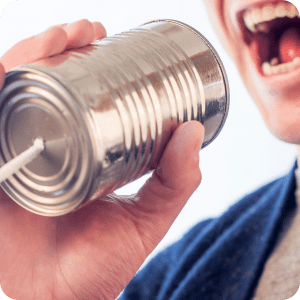 Hotels still have decisions to make in times of crisis. But when they do, they might only have 20% of the information required. Most businesses will either take a back seat and passively allow the crisis to gradually tighten its grip around them or completely overreact. But successful hotels will prepare themselves for the crisis and stand up and take control.
Hotels still have decisions to make in times of crisis. But when they do, they might only have 20% of the information required. Most businesses will either take a back seat and passively allow the crisis to gradually tighten its grip around them or completely overreact. But successful hotels will prepare themselves for the crisis and stand up and take control.
Hindsight is a beautiful thing, and retrospectively you might not get it all right, but it is important to embrace being uncomfortable and communicate.
Anyone who has ever been in a relationship will testify that the moment communication breaks down, there is trouble on the horizon. There are myriad ways of communicating with your guests—here are four of the best to use in times of crisis.
Communicating honestly and flexibly
Honesty should be your core value. Hotels should be constantly connecting and communicating with guests using multiple platforms—from call center outsourcing to social media—and be candid with them every step of the way.
Guests are, quite understandably, going to be personally upset by any crisis, and they might even forget that your hotel isn’t responsible for it!
“The most fortunate of us all in our journey through life frequently meet with calamities and misfortunes which greatly afflict us….”
But your business is hurting too, so let them know using intelligent systems such as calls transfer, for example. The more honest you are about the situation, the more likely it is that guests will empathize and want to support you. And don’t forget that being honest should extend to your employees too; without them, you have no guests.
Being flexible with your guests is a sure-fire way to ensure their future loyalty. Don’t be short sighted and just think about the now. The current crisis might last a few years, but there is a whole lot of time left for guests to stay at your hotel—or with a competitor if you are not flexible with changes and cancellations.
Communicating through employee training
Developing a professional team during the good times should be a priority before a crisis hits. Regular, flexible training will ensure that your hotel is prepared for any eventuality, and staff will be able to promptly identify issues.
Gone are the days when the whole team had to sit in a room together for this to happen; why not take advantage of eLearning platforms to give staff flexibility?
Creating a digital workplace can also be used to strengthen hotel staff training. To be able to properly do their jobs, staff need to be able to access all information, all the time, from anywhere. Implementing a mobile employee workplace and call forwarding system will make your hotel’s system for tasks, such as best practices and health and safety, far more efficient.
In times of crises, your hotel is far more likely to be faced with problems—problems that you would prefer your guests not to see. Training staff, who today might work from anywhere, in the use of your digital workspace means that you empower them to resolve those problems.
Quick access to your standard operating procedures will allow staff to make correct, informed decisions. Swift digital reporting of issues to management will prevent the problem from escalating. And speedy photo-sharing of breakages within the hotel, for example, will allow your staff to address a problem before any guests notice.
Communicating with social media
As a hotel, your priority should always be to think about how to strengthen the perception of your business.
A time of crisis is the perfect moment to stand out from the competition. Social media is the secret weapon that has helped many businesses through the current pandemic, and all hotels should harness its power to their advantage. It is our omnipresent companion that keeps us connected to the world, and it can be used to communicate with guests—past, present, and future.
Your hotel can use multiple social media platforms for functional purposes such as keeping guests informed about your status—when you are closed, for how long, and when you will open again. But it can also be used to promote your hotel.
In these germ-fearing times, the public is reassured by any business that shows it respects customer safety by carrying out extra cleaning. You could use a YouTube video maker to livestream your staff cleaning—as well as your beautiful hotel to show guests what they are longing to get back to.
Also, use social media to actively market your location. What local street food will guests be able to find when they stay at your hotel? What local cultural events will attract guests? And where is the beautiful local architecture that draws in the crowds?
Communicating through marketing and sales
When we are stuck in the quicksand of a crisis, it is often hard to think about the afterwards. But the crisis offers an opportunity for hotels to take stock and analyze how they can market themselves so customers will book a trip whilst daydreaming in lockdown or other difficult circumstances.
They’re imagining a world in which they are free to visit your hotel and you’re imagining a world where your business phone system is constantly ringing.
The lull in business is a chance to revitalize your website—especially your homepage. Your hotel needs to reflect the societal changes the crisis has provoked, but you also need to appear ready to welcome guests back.
Your webpage is your principal portal to successfully communicate your message to guests through careful manipulation of language. Be sympathetic while offering opportunities to postpone rather than cancelling.
You could offer guests something of extra value—the chance of a free upgrade—that will entice even the most timid traveler. Additionally, make sure to use technology to your advantage so your website will be at the very top of a Google search. By focusing on SEO, your website should be optimized with new keywords that reflect the contemporary landscape.
Conclusion
Guests will be bored and frustrated after any crisis, and they will be itching to visit you. But for them to find you, enjoy their stay, and return to your hotel, your hotel needs to focus on communication every step of the way.
…To fortify our minds against the attacks of these calamities and misfortunes should be one of the principal studies and endeavors of our lives.” Thomas Jefferson
About the author
 Jessica Day is the Senior Director for Marketing Strategy at Dialpad, a modern business communications platform that takes every kind of conversation to the next level—turning conversations into opportunities. Jessica is an expert in collaborating with multifunctional teams to execute and optimize marketing efforts, for both company and client campaigns. Here is her LinkedIn.
Jessica Day is the Senior Director for Marketing Strategy at Dialpad, a modern business communications platform that takes every kind of conversation to the next level—turning conversations into opportunities. Jessica is an expert in collaborating with multifunctional teams to execute and optimize marketing efforts, for both company and client campaigns. Here is her LinkedIn.



















